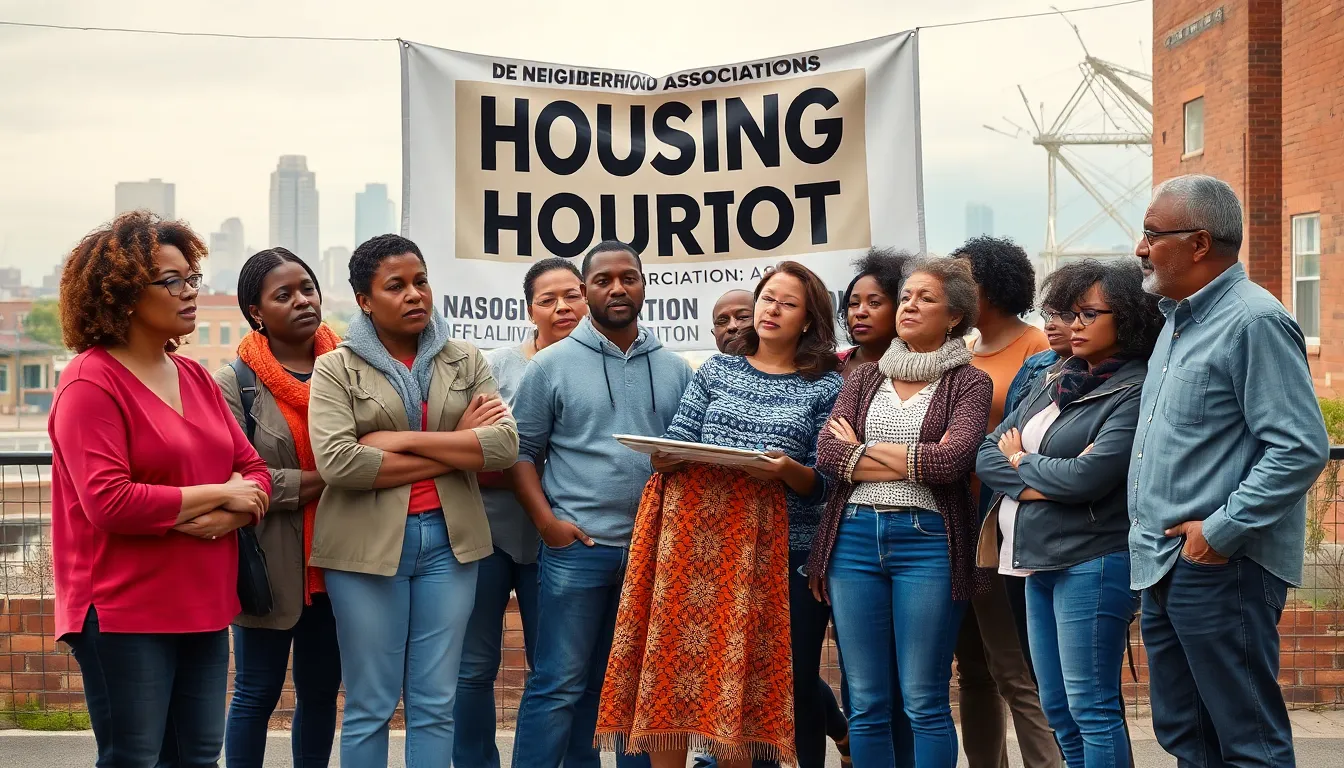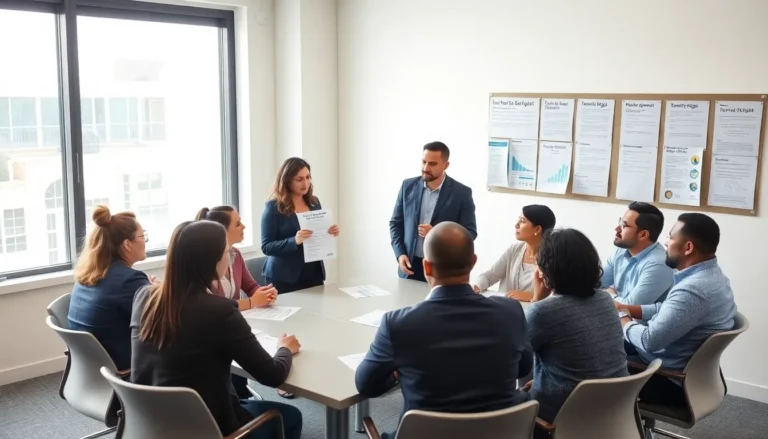In a world where rent prices soar higher than a kite on a windy day, renters advocacy groups have emerged as the superheroes of the leasing realm. Armed with knowledge and determination, these organizations fight for the rights of tenants, ensuring they don’t get left out in the cold—or worse, on the street.
Table of Contents
ToggleOverview of Renters Advocacy Groups
Renters advocacy groups play a vital role in the housing sector. These organizations focus on protecting renter rights across various communities. By providing resources and support, they empower tenants to navigate housing challenges, from unfair eviction notices to lease agreements.
Members of these groups often engage in local policy advocacy. They lobby for regulations that improve rental conditions and promote affordable housing. Additionally, many organizations offer legal assistance and educational programs, equipping tenants with knowledge regarding their rights and responsibilities.
Across the nation, these advocacy groups vary in size and scope. Local organizations typically address specific regional issues, while national entities tackle broader, systemic problems. The National Low Income Housing Coalition, for example, advocates for low-income renters on a national level.
Participation in renters advocacy can produce meaningful impact. Collectively, tenants can influence housing policies, challenge unjust practices, and foster community engagement. Many groups organize events, workshops, and campaigns that highlight tenant issues, drawing attention from policymakers and the public.
Understanding the landscape of renters advocacy groups proves essential for tenants. Awareness helps individuals seek assistance when facing housing difficulties. Connecting with these organizations offers invaluable support, whether through legal help or community resources.
Importance of Renters Advocacy Groups
Renters advocacy groups play a crucial role in empowering tenants and enhancing their living conditions. These organizations not only protect renter rights but also contribute significantly to policy reform.
Supporting Tenant Rights
Advocacy groups focus on ensuring that tenants understand and exercise their rights. Legal representation often becomes available to those facing eviction or discrimination. Educational initiatives help renters navigate complex lease agreements and state regulations. These organizations offer resources that inform tenants about their entitlements, such as security deposits and maintenance responsibilities. Many groups provide workshops that build awareness of tenant-specific laws. By fostering an environment of knowledge, renters can advocate for themselves and seek justice effectively.
Addressing Housing Issues
Addressing pressing housing challenges remains a priority for renters advocacy groups. Organizations tackle problems related to affordability, security, and displacement. They often participate in local policy discussions, advocating for increased funding for affordable housing initiatives. Research indicates that collective efforts lead to improvements in rental laws, enhancing protections against unjust evictions. Many groups focus on creating a dialogue between tenants and landlords, facilitating better communication and understanding. Thus, advocacy efforts promote more fair and equitable housing practices within communities.
Key Organizations in Renters Advocacy
Various organizations play pivotal roles in renters advocacy across different levels. They work toward improving conditions for tenants and ensuring housing rights are protected.
National Organizations
National organizations focus on broader systemic issues affecting renters. The National Low Income Housing Coalition advocates specifically for low-income renters, promoting policies to enhance affordability and access. They conduct research and mobilize resources, helping to shape rental housing policies at the national level. Another prominent group, the National Housing Law Project, emphasizes legal advocacy, providing resources and support for tenants facing eviction and discrimination. These organizations unite voices nationwide, pushing for essential reforms and raising awareness about renters’ challenges.
Local Organizations
Local organizations address specific regional issues by catering to the unique needs of their communities. They often provide tenants with direct assistance, including legal counsel and educational programs regarding rights and responsibilities. For instance, housing justice organizations in urban areas focus on tenant organizing, often leading campaigns against unjust rent increases. Groups such as the Tenants Union advocate at the grassroots level, enabling renters to engage in policy discussions that impact them locally. By connecting tenants to resources, local organizations empower communities and foster initiatives promoting affordable housing solutions.
Effective Strategies Employed by Renters Advocacy Groups
Renters advocacy groups utilize various strategies to support tenants. These techniques empower individuals while promoting collective action within communities.
Community Organizing
Community organizing serves as a crucial strategy for renters advocacy groups. Members come together to raise awareness about tenant issues. These efforts often include outreach programs, workshops, and community meetings to educate renters on their rights. Organizers encourage participation in local policy discussions. They focus on building strong networks among tenants, fostering solidarity against unfair practices. Collaborative campaigns help amplify tenant voices, attracting attention from local media and lawmakers. Engaging the broader community enhances visibility for key housing issues. This grassroots approach enables renters to challenge unjust legislation effectively.
Legal Assistance
Legal assistance plays a vital role in the support provided by renters advocacy groups. Many organizations offer free or low-cost legal services to tenants facing eviction or discrimination. These services help individuals navigate complex legal systems confidently. Legal representatives advocate on behalf of tenants during court proceedings, ensuring their rights are upheld. Educational workshops on tenant laws and rights empower renters by equipping them with knowledge. By raising awareness of housing regulations, groups help prevent unjust evictions. Access to targeted legal assistance structures a safety net for vulnerable renters. These efforts ultimately promote fair treatment in housing matters.
Challenges Faced by Renters Advocacy Groups
Renters advocacy groups encounter various challenges that can hinder their effectiveness.
Funding Limitations
Funding limitations pose significant obstacles for many advocacy groups. Many organizations rely on grants and donations, which can fluctuate unpredictably. Competition for available resources often leads to insufficient financial support. Limited budgets restrict the scope of services groups can provide, reducing their impact. Consequently, these constraints hinder outreach efforts and diminish the ability to expand programs. Smaller local organizations may face even greater challenges, as they might not have access to the same resources as larger national entities. Striving for sustainability remains a critical concern for these groups.
Resistance from Landlords
Resistance from landlords creates additional challenges for renters advocacy groups. Many landlords oppose regulatory changes that promote tenant rights or affordable housing initiatives. This opposition can make it difficult for groups to enact meaningful policy reforms. Some landlords view advocacy efforts as threats to their interests, resulting in pushback during negotiations or advocacy campaigns. Such resistance delays the implementation of necessary changes and discourages tenant participation. Overall, a more cooperative approach from landlords could foster better dialogue between parties, ultimately benefiting both tenants and property owners.
Conclusion
Renters advocacy groups play a crucial role in shaping housing policies and protecting tenant rights. By uniting voices and fostering community engagement they empower individuals to navigate the complexities of rental agreements and legal challenges. These organizations not only provide essential resources but also advocate for systemic changes that promote affordable housing and fair treatment.
As the housing landscape continues to evolve it’s vital for tenants to remain informed and actively participate in advocacy efforts. By doing so they can contribute to a more equitable housing environment. The commitment of renters advocacy groups to support and uplift tenants ensures that their voices are heard in the ongoing dialogue about housing rights and policies.





